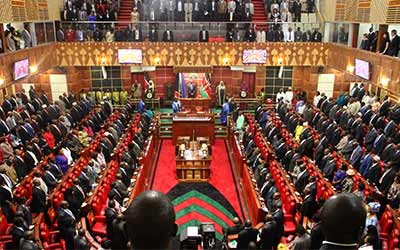Kenya’s national assembly has been accused of blocking justice and reparations for victims of human rights violations by failing to consider the findings of a 2013 report by the country’s Truth, Justice, and Reconciliation Commission (TJRC).
A coalition of seven human rights organizations said on Tuesday said that the parliament has for more than six years now, failed to adopt the TJRC Report and put in place a mechanism to undertake implementation of its recommendations.
Kenya’s transitional justice process started after the contested 2007 presidential elections sparked mass violence, resulting in the deaths of at least 1,133 people, destruction of homes and properties, sexual and gender-based crimes, and forcible displacement of thousands of people.
Two transitional justice mechanisms were created, a truth, justice, and reconciliation process, which led to the creation of the commission, and ultimately, proceedings before the International Criminal Court (ICC).
According to the rights groups, both processes have failed to ensure justice and redress for victims of serious crimes, and impunity and suffering prevail.
“We cannot talk of justice and healing when some Kenyans continue to languish in the pain of past injustices,” said Agatha Ndonga, head of the International Center for Transitional Justice in Kenya.
“The Kenyan state has a duty to ensure that all Kenyans who have suffered harm, as laid out in the TJRC report, are duly compensated to restore their dignity,” she added.
The TJRC’s mandate was to examine a wide range of abuses and injustices since independence up to the 2007-2008 political violence period. It made a wide range of recommendations aimed at accountability and reconciliation to heal historical injustices in Kenya.
It proposed various forms of reparations for victims and a reparations policy framework, and recommended that the National Assembly develop guidelines to carry them out. The commission presented its final report to President Uhuru Kenyatta on May 21, 2013.
Under Kenya’s 2008 Truth, Justice, and Reconciliation Act (TJR Act), implementation of the recommendations was to begin immediately after the National Assembly considered the report.
“However, the National Assembly has, for more than six years now, failed to adopt the TJRC Report and put in place a mechanism to undertake implementation of its recommendations, said the seven organizations. Kenya’s National Assembly has also made legislative changes that undermine the effectiveness of the transitional justice process,” the groups noted.
The groups includes the International Center for Transitional Justice, Human Rights Watch, Kenya Human Rights Commission, The National Victims and Survivors Network, Grace Agenda, Center for Memory and Development, and Wangu Kanja Foundation –said that hundreds of victims are still waiting for justice, medical and psychological help, compensation, and other redress from the government.
JK/abj/APA


